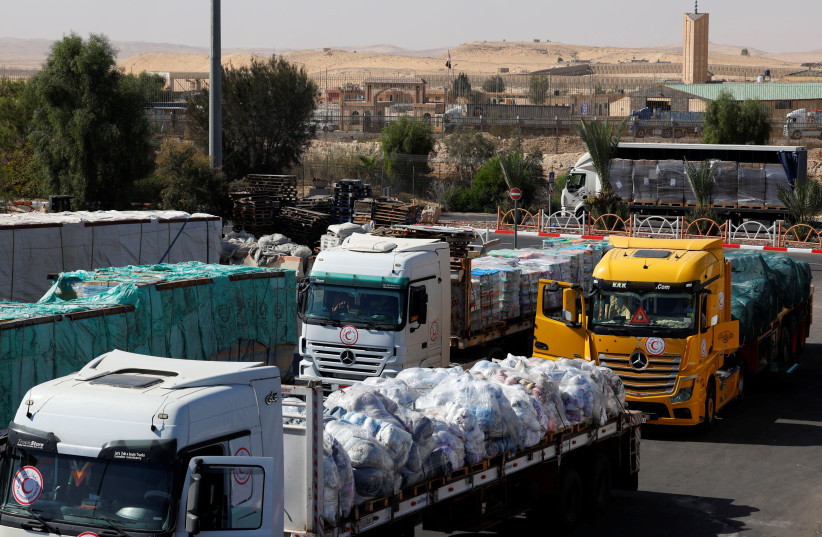Some 59% of Israelis support humanitarian pauses in the fighting in the Gaza Strip, but only if Hamas releases hostages, according to a new survey published by Maariv on Friday.
According to the poll, 39% of those who supported humanitarian pauses demanded that all the hostages be released beforehand, and 16% demanded that at least some be released. Some 30% of Israelis oppose a ceasefire, whether or not hostages or released. Only 3% support an unconditional ceasefire.
Among Arab respondents, 41% said that they believe that any ceasefire needs to be based on the release of hostages. Some 32% of Arab respondents had no opinion on the matter and 6% opposed any humanitarian ceasefire.
A survey by the Israel Democracy Institute published on Friday found that 38% of Israelis believe the government should already be conducting negotiations with Hamas to exchange Palestinian prisoners for the hostages being held by Hamas but should continue fighting as well. Some 22% of Israelis believe there should not be negotiations at all, 21% believe negotiations should take place even if it means needing to halt the fighting, and 10% believe that negotiations should take place after the war is over.

What should happen in Gaza after the war?
Maariv's poll on Friday additionally found that Israelis are split on what should happen in Gaza once Hamas is defeated.
Some 41% of respondents support exiting the Strip, with the largest portion of these respondents (33%) favoring international rule and only 8% supporting having the Palestinian Authority take control.
Some 44% of respondents support having Israel stay in the Strip, with 22% saying they want Israel only to have security control and another 22% saying they want there to be settlements in the Gaza Strip as well. The highest support for remaining in the Strip among Jewish respondents came from religious (44%) and Haredi respondents (48%).
Among Arab respondents, 37% said they were unsure what should be done in Gaza after Hamas is gone. Only 15% supported having Israel stay in the Strip, with 31% supporting Israel leaving the Strip. Most of those who supported having Israel leave the Strip supported transferring control to international entities.
Who should be prime minister?
When asked who would be better as prime minister between Benjamin Netanyahu and Benny Gantz, 26% of respondents said Netanyahu, 52% said Gantz, and 22% said they were unsure.
Among respondents who voted for the Likud Party in the last elections, 53% said they would prefer Netanyahu as prime minister, while 24% said they would prefer Gantz and 23% said they were unsure. Among respondents who voted for the National Unity Party, only 2% said that they believed that Netanyahu was the better option.
If elections were held today, the National Unity Party would earn 40 seats, the Likud Party would earn 18 seats, Yesh Atid would earn 14 seats, Yisrael Beytenu and Shas would earn nine seats each, United Torah Judaism would earn seven seats, Otzma Yehudit, Hadash-Ta'al, and Ra'am would earn five seats each, and Meretz and the Religious Zionist Party would earn four seats each.
The opposition parties (excluding Hadash-Ta'al which traditionally does not join coalitions) would earn 72 seats in total, while the current coalition would hold 43 seats.
How are volunteers, the IDF, and the prime minister performing?
The survey conducted by the IDI on Friday asked respondents how they rate the performance of ZAKA, IDF combat forces, the IDF spokesperson, the IDF senior command, and the prime minister.
Some 93% of Jewish respondents and 48% of Arab respondents rated ZAKA's performance as good or excellent, 93% of Jews and 17% of Arabs rated IDF combat forces favorably, 86% of Jews and 11% of Arabs rated the IDF spokesperson favorably, and 65% of Jews and 11% of Arabs rated the IDF senior command favorably.
In terms of Netanyahu's performance in the war, only 26% of Jews and 2% of Arabs rated him favorably. Among respondents who voted for the coalition in the last elections, 49% rated Netanyahu favorably.
The IDI additionally asked respondents if ZAKA should be adopted as a public service so that it would receive more public funding and not have to rely as much on donations, with 85% of respondents saying they were in favor of such a step.
Optimism about Israel's future rising
The IDI also asked if respondents were optimistic or pessimistic about the future of the State of Israel. While in June, only half of Jewish respondents said they were optimistic, that share has now grown to 72%. Additionally, the IDI saw a small increase in optimism among Arab respondents at the beginning of the war, but that optimism has since gradually declined to the point where only a quarter are now optimistic, the lowest share the IDI has recorded since it began measuring optimism in 2009.
Respondents were also asked if they would prefer to move abroad or live in Israel, with a large majority of both Arab and Jewish respondents saying they would rather stay in Israel. Among Jewish respondents, the share of people who would rather move is at the lowest level it has been in the last decade.
The IDI asked respondents as well if they feel part of the state and its problems and found a sharp increase in respondents who answered positively compared to June of this year, with 70% of Arabs saying they feel part of the state and 94% of Jews saying the same.
